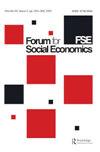Transition and Labour in United States: Industry and Employment in the Changing Political Economy of Knowledge Capitalism
IF 1.2
Q4 ECONOMICS
引用次数: 0
Abstract
Abstract The history of capitalism in the United States since the crisis of the 1970s is marked by a process of global scope: the decline of industrialism. This represents the transition to a new era of capitalism as a mode of production. The US has experienced a set of interlocked processes, three of which are of fundamental interest for this article: the structural change from industrial to knowledge-based economy; the making of neoliberal policies that allowed for the financialisation of the economy and the weakening of unions; the transformation of the corporate model. Consequently, there is an intense downward pressure on wages, job quality and middle-class employment. This translates into the loss of benefits for workers and a decline in job security. This article addresses these processes through the lenses of an evolutionary theory of history. From this perspective, the observed changes are expressions of the transition to a post-industrial capitalism that entails destruction of old jobs and the creation of a pool of labour with limited bargaining capacity.美国的转型与劳动:知识资本主义政治经济变迁中的工业与就业
本文章由计算机程序翻译,如有差异,请以英文原文为准。
求助全文
约1分钟内获得全文
求助全文

 求助内容:
求助内容: 应助结果提醒方式:
应助结果提醒方式:


